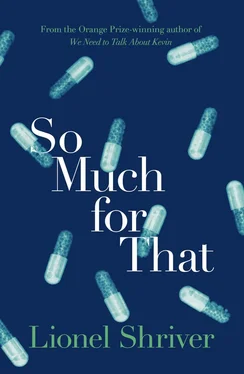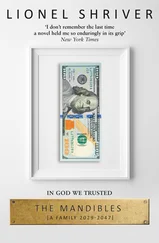Shep wasn’t used to talking so much, and babbling made him feel foolish. He may have been as dependent on resistance as Glynis, which is to say: hers. “You think I’m being selfish. Maybe I am. For once. This isn’t about money, it’s about” – he paused in embarrassment – “my soul. You’ll say, you have said, that it won’t be what I expect. I accept that. It’s not as if I nurse a misguided idea about parking myself on the beach. I know sun gets boring, that there are flies. Still, I can tell you this much: I plan to get eight hours of sleep. That sounds small, but it’s not small. I love sleeping, Glynis, and” – he didn’t want to choke up now, not until he got it all out – “I especially love sleeping with you. But when I say I crave eight hours of sleep, at a Westchester dinner party? They laugh . For commuters around here, that’s such a preposterous ambition that it’s actually funny.
“So I don’t care what else I’ll do in Pemba or whether the power keeps cutting off. Because if I back down this time? I’d know in my heart of hearts that we’re never really going to go. And with no promised land to look forward to, I can’t keep it up, Gnu. I can’t keep cleaning up the messes that the untrained klutzes at Hardly Handy Randy leave behind. I can’t keep sitting in traffic for hours listening to NPR on the West Side Highway. I can’t keep running to the A-and-P for milk and getting ‘bonus points’ on our store card so that after spending several thousand dollars we qualify for a free turkey on Thanksgiving.”
“There are worse fates.”
“No,” he said. “I’m not sure there are. I know we’ve seen plenty of poverty – raw sewage running in gutters and mothers scavenging for mango peels. But they know what’s wrong with their lives, and they have a notion that with a few shillings or pesos or rupees in their pockets things could be better. There’s something especially terrible about being told over and over that you have the most wonderful life on earth and it doesn’t get any better and it’s still shit. This is supposed to be the greatest country in the world, but Jackson is right: it’s a sell, Glynis. I must have forty different ‘passwords’ for banking and telephone and credit card and Internet accounts, and forty different account numbers, and you add them all up and that’s our lives. And it’s all ugly, physically ugly. The strip malls in Elmsford, the K-Marts and Wal-Marts and Home Depots … all plastic and chrome with blaring, clashing colors, and everyone in a hurry, to do what?”
It was not his imagination. She really wasn’t paying attention.
“I’m sorry,” he said. “You’ve heard this before. Maybe I’m wrong, and maybe I really will skulk back home a few weeks later all hangdog and sheepish. But I’d rather the humiliation of trying and failing than give it up. Giving it up would be like dying.”
“I think you’ll find” – her voice was so measured, piped full of some great new wisdom he did not care for – “that it would not in the least be like dying. There is nothing like dying. We use it as a metaphor for something else. Something smaller and silly and much more bearable.”
“If this is your idea of getting me to change my mind, it’s not working.”
“When is this you’re planning to depart our shores?”
“Next Friday. BA-179 out of JFK, the 22:30 for London. Then on to Nairobi, to Zanzibar, to Pemba. You and Zach can come with me up until the minute the flight closes. In the meantime, I thought I’d clear off and give you a chance to think.” A chance to miss me is what he meant. To miss me while you can still un-miss me . And in all honesty he was afraid of her. If he remained here, she would be able to talk him out of it. She was that good. “I’ll be staying with Carol and Jackson. They’re expecting me, and you can reach me there at any time before I go.”
“I do wish you wouldn’t,” she said idly. Having picked up her glass from the table, Glynis rose and smoothed her slacks in a gesture that he recognized as marshaling herself to prepare another ordinary dinner. “Randy is for once entirely handy, and I’m afraid I will need your health insurance.”
Later that evening, while Glynis was still tidying the kitchen, Shep slipped upstairs and pulled the bathrobe off his suitcase. He put the two shirts back in the third drawer of his dresser, smoothing them so they’d be in respectable condition for work. He removed the needle-nose Vise-Grips, the screwdrivers, and the hacksaw, then fit them back into the tiers of his battered red metal toolbox. When he was down to the comb, before laying it in its accustomed place beside the cigar box of leftover foreign currency, he ran it through his hair.
chapter two Contents Cover Title Page Copyright Dedication Epigraph Dedication Contents Cover Title Page Copyright Dedication Epigraph chapter one chapter two chapter three chapter four chapter five chapter six chapter seven chapter eight chapter nine chapter ten chapter eleven chapter twelve chapter thirteen chapter fourteen chapter fifteen chapter sixteen chapter seventeen chapter eighteen chapter nineteen acknowledgments about the book Praise for So Much for That About the Author Also by Lionel Shriver About the Publisher To Paul. In loss, liberation. chapter one chapter two chapter three chapter four chapter five chapter six chapter seven chapter eight chapter nine chapter ten chapter eleven chapter twelve chapter thirteen chapter fourteen chapter fifteen chapter sixteen chapter seventeen chapter eighteen chapter nineteen acknowledgments about the book Praise for So Much for That About the Author Also by Lionel Shriver About the Publisher
He’ll never go, said Carol, rinsing arugula.
“Bullshit,” said Jackson, as he stole a piece of Italian sausage from the sautéed peppers. “He’s bought the ticket. I’ve seen it. Or them. I told him not to waste the money on the other two. She’ll never go, that’s for sure. I figured it out way before Shep did. Glynis thought it was a game, all those trips. A game she got tired of.”
“You always think I mean he’s too much of a coward. That’s not it. He’s too responsible. He’ll never leave his family high and dry; it’s not in him. Pick up his carry-on and never look over his shoulder? Start a whole new life from scratch, when he’s almost fifty? Have you ever known anyone to do that really, and why would they anyway? Even if he does go, to make a point or something, he’ll come right back home – Flicka, it’s been at least half an hour. Have you put in your tears?”
Their elder daughter emitted a nasal sigh, halfway between a groan and a bleat. Its tonalities were refined, managing to convey both no and yes. She rustled begrudgingly into her sweater pocket for the Ziploc, then dosed both eyes from one of several dozen tiny plastic squeeze tubes of Artificial Tears, whose shape always reminded Jackson of Fat Man dropped on Nagasaki. As usual, Flicka’s eyes were aflame, the lashes caked with petroleum jelly.
“What, tail between legs?” said Jackson. “You got no appreciation of male pride.”
“Oh, don’t I?” Carol shot him a look. “Where is this ‘Pemba’ anyway?”
“Off the coast of Zanzibar,” said Jackson. “It’s famous for growing cloves. Whole island stinks of them, or that’s what Shep tells me. I picture my man leaning back in his hammock, breathing in the smell of hot whisky and pumpkin pie.”
“I bet he’ll go,” said Flicka. “If he says he’s going to. Shep’s not a liar.” Though often mistaken for her eleven-year-old sibling’s younger sister, she was sixteen: just as one calculated the relative age of pets, her true age in terms of human suffering was closer to 103. The here and now having proved an eternal trial, Flicka was naturally captivated by the idea of somewhere else.
Читать дальше












